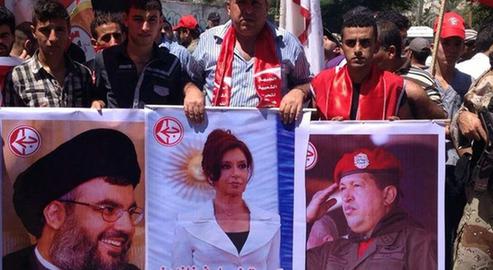Tensions between the United States and Iran may soon spill over from the Middle East into Latin America. On a recent 5-day trip to Iran in December 2008, Ecuadorean President Rafael Correa and Iranian President Mahmoud Ahmandinejad declared theirs to be a strategic alliance that transcends bi-national trade in a meeting between Ecuadorean and Iranian political, military, and business leaders in Teheran. The meeting is the second between high-ranking Ecuadorean and Iranian officials in 5 months, and underscores a significant strengthening of relations between the two OPEC members.
Unlike the meeting this past July, the December meeting represents a shift in Iranian-Ecuadorian relations. According to Prensa Latina, Iran announced they would be willing to “offer strategic advice and cooperation in South-South cooperation in many fields”, going beyond the trade accords highlighted in July.
One of those fields appears to be military aid. Venezuelan national airline Conviasa recently announced they will allow the use of a civilian air-route between Teheran-Damascus-Caracas to transport military equipment and technology supplied by the Iranian army, thereby increasing the central Asian nation’s ability to legally transport military equipment to Latin America, using Caracas as a jump-off point.
This is serious news for the US’s strongest regional ally, Colombia. Wedged between Venezuela and Ecuador, two of Iran’s staunchest allies in Latin America, Colombia has had fragile relations with their immediate neighbors since 1 March, when Colombian military officials killed FARC commander Raul Reyes on Ecuadorean soil, prompting the immediate mobilization of Ecuadorean and Venezuelan armies to their respective borders with Colombia. The issue was never formally resolved, and tensions between the Bogota-Caracas and Bogota-Quito have remained high, most noticeably at the borders.
The current Ecuadorian administration has spent more than twice on defense what the previous three administrations spent combined. This dedication to military spending may have something to do with the improved relations with Iran. As oil prices plummet, Iran will look for new ways to raise capital. According to the Wall Street Journal, oil exports account for 80% of Iran’s revenue. Fresh off the heels of his meeting with President Ahmandinejad, President Correa claimed that Ecuador would use Iranian military intelligence and equipment to bolster security at the Ecuador-Colombia border.
Public outrage stemming from the 1 March attacks may be behind Correa’s decision. The Ecuadorean leader must preserve Ecuadorean sovereignty, who many feel has been trampled in recent years by foreign debt, foreign military bases and interventions, and the implementation of the dollar in 2000. Always a particularly sensitive subject, the “invasion” on Ecuadorean soil has made sovereignty a political hot button for Correa, who faces re-election in 2009.
While the further militarization of the Ecuadorean-Colombian border remains a possibility, especially given the current Ecuadroean administration’s commitment towards defense spending, it remains unclear whether Iran will effectively be able to contribute as it hopes. Tensions between Iranian Parliament and President Ahmandinejad may prevent the Iranian President from diverting more spending abroad, when the nation is currently facing a budgeting crisis of its own at home due to the fall in oil prices. On the other side of the issue is Ecuador’s commitment to improving defense at its northern border. Iran’s knowledge, experience, and commitment to defense spending make it a viable candidate for a nation looking to improve border security.
Whatever the immediate economic realities may permit, the intent for closer ties is clearly there. Iran is looking to improve relations with Latin American nations, and according a report by the Los Angeles Times, already has made significant inroads. In addition to projects in Venezuela and Bolivia, the report cites a Hezbollah presence in Paraguay, who just elected a leader who is more ideologically similar with Iran’s allies in Latin America (Venezuela, Bolivia, Ecuador to name a few), than those of the United States. While Iran’s ability to exert foreign influence may be limited in 2009, they have already planted the seeds for increased political, economic, and military cooperation in Latin America.

Reply